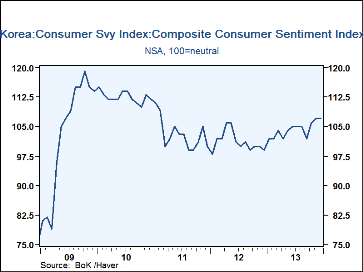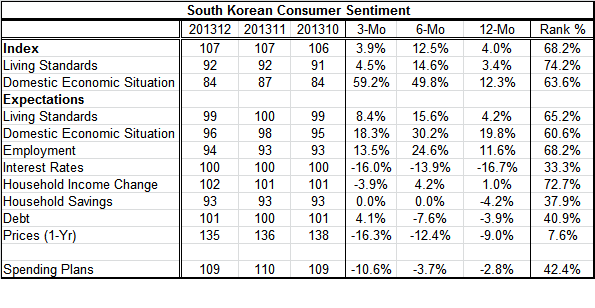 Global| Dec 26 2013
Global| Dec 26 2013South Korean Confidence Continues Its Slow Progress in December
Summary
Korean consumer confidence continues to show progress. While the overall index flattened at 107 this month, it held the jump to 107 that it made in November from 106 in October. The rate of growth in overall sentiment at 3.9% (SAAR) [...]
 Korean consumer confidence continues to show progress. While the overall index flattened at 107 this month, it held the jump to 107 that it made in November from 106 in October. The rate of growth in overall sentiment at 3.9% (SAAR) over 3-months is nearly identical to its 4% pace over 12-months.
Korean consumer confidence continues to show progress. While the overall index flattened at 107 this month, it held the jump to 107 that it made in November from 106 in October. The rate of growth in overall sentiment at 3.9% (SAAR) over 3-months is nearly identical to its 4% pace over 12-months.
The domestic economic situation is advancing extremely rapidly in South Korea. However, it is only `catching up' to the progress in overall living standards as well as with the sentiment index overall. The domestic economic situation stands in the 63rd percentile of its historic rank while the overall living standards are positioned in the 68th percentile of their historic queue.
The queue measures allow us to evaluate the position of the month's responses in historic profile while the growth rates speak to momentum. The rank responses show how very contained inflation is expected to be. Its assessment has been lower than this month's evaluation only about 7% of the time. On the other hand, household income changes stand in the 74th percentile of their historic queue; this response has been higher historically only about 25% of the time.
Despite the obvious progress and gain in expectations, South Korean spending plans have been receding steadily, over 3-month, 6-month and 12-month. Their historic standing is only in the 42nd percentile of their historic queue- below the mid point. While Koreans are upbeat in their `expectations' it is clear that their current actions continue to lag behind these expectations. This has been a more or less worldwide phenomenon. Nowhere in the world does an improvement in conditions that seem to multiply upon itself. Actual improvement - even expectations of improvement - are acted upon, instead, with some degree of skepticism. No economy has really been able to jumpstart growth. Rather where growth emerges it continues to be slow and reluctant. And so it is in South Korea too.

Robert Brusca
AuthorMore in Author Profile »Robert A. Brusca is Chief Economist of Fact and Opinion Economics, a consulting firm he founded in Manhattan. He has been an economist on Wall Street for over 25 years. He has visited central banking and large institutional clients in over 30 countries in his career as an economist. Mr. Brusca was a Divisional Research Chief at the Federal Reserve Bank of NY (Chief of the International Financial markets Division), a Fed Watcher at Irving Trust and Chief Economist at Nikko Securities International. He is widely quoted and appears in various media. Mr. Brusca holds an MA and Ph.D. in economics from Michigan State University and a BA in Economics from the University of Michigan. His research pursues his strong interests in non aligned policy economics as well as international economics. FAO Economics’ research targets investors to assist them in making better investment decisions in stocks, bonds and in a variety of international assets. The company does not manage money and has no conflicts in giving economic advice.
More Economy in Brief
 Global| Feb 05 2026
Global| Feb 05 2026Charts of the Week: Balanced Policy, Resilient Data and AI Narratives
by:Andrew Cates






